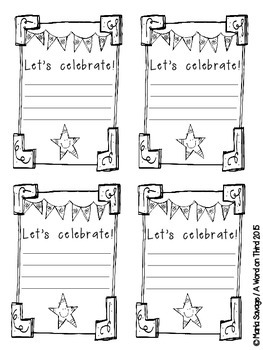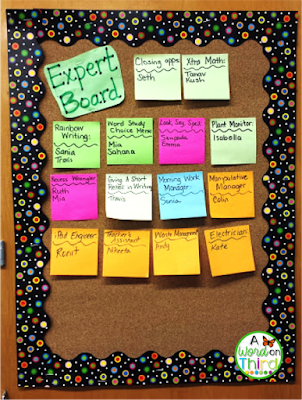How To Best Boost Student Confidence
Monday, April 18, 2016
in
growth mindset,
happy notes home,
parent communication,
teacher language
-
3 comments
Have you ever felt that you worked your butt off only to receive no validation? Ever feel like you hear a never-ending stream of what to improve upon but nothing about what you did well? Of course you have. We all have. It feels AWFUL, doesn't it?
Now, have you ever had a teacher, parent, or boss who always seemed to notice the little things you did to make a difference? Didn't it feel like a million bucks that someone noticed all of that hard work?? Especially when you're used to the little criticisms all the time!
It is really easy for teachers to fall into the trap of constant critiquing. Most of us were taught this way as children. In college, we were taught to look at assessments, find the mistakes, and teach into those mistakes. What if I told you that your students could accomplish the same (or better!) learning if you spent some time looking at what was working really well for your students before looking for their mistakes? It's true! Anyone who has had a teacher that behaved this way can attest to this. Think about your own best, most loved teachers--they probably did this for you.
Today I want to teach you my current 5 favorite tips for boosting student confidence. They are quick and easy to implement, and they will drastically improve morale with and among your students because they will give students a sense of significance. And along with confidence comes academic performance, so there's no reason not to try these tips!
1. Use a TON of reinforcing language.
Reinforcing language is just constant noticing and naming of the good things you see in your classroom. If a child finally capitalizes a proper noun or puts a metaphor in his writing, you could use reinforcing language to reinforce that behavior by saying, "Wow, I can see you used a metaphor to craft your writing. Now I can really imagine what that must feel like for the character in your story. Your readers will be able to envision that too!"
I previously scoped about this topic. You can watch my video about the 3 Rs of language (reinforcing, reminding, and redirecting) here. The big take aways are that you want to be SPECIFIC and remove potential approval-seeking. Saying "Good job," is nice, but saying "Good job on adding that apostrophe in that contraction," is better! And to keep learning intrinsically motivating for kids, try to avoid saying the words, "I love how you..." or "I'm so proud that you..." You are already communicating how proud you are of a behavior by noticing it, but now the implication is that your students should do this for themselves and not for you. Seriously go back and watch that scope in my link. I go into deep detail in that post/video!
2. Give students physical reminders of their successes.
Now go right ahead and use that reinforcing language on some sort of tangible reward. This is a permanent way of honoring success, which kids with lower confidence levels need. I created some color and black-and-white "Happy Notes" for my students. They are FREE in my Teachers Pay Teachers store. Click the picture below to be taken to get your free download. And while you're there, make sure to follow my store. I'm always posting freebies!!
Again, just make sure to be specific when you write your feedback. For kids who aren't particularly good at remembering their successes, this helps. Happy notes in my classroom are often taped to desks, used as book marks, etc. I don't ask the kids to do this. They do this on their own. The fact that right now in April, some of my third graders still have some of these notes from September is amazing to me. They must be very important to them if they still have them! I even get thank-you emails from parents, stating that these notes proudly reside on their refrigerators at home. I don't care if you write something amazing on a piece of scrap paper! I guarantee you it will be treasured--even if the student might not be ready or confident enough to admit it.
3. Celebrate all students publicly, but ask for permission.
One thing I love doing is talking about the great learning I'm seeing. If I ask the kids to turn and talk, I might share 2 or 3 memorable things I heard kids talking about. If someone struggled during class but persevered and figured out how to get to a solution, I might talk about that at the end of class during the closing portion of my lesson. This sets a positive tone in your room. You get back what you give out, so give out POSITIVITY!
Some students might feel a little embarrassed by this, so I make sure to ask permission before I share anything. If they aren't comfortable with me sharing a name, I might ask if it's OK if I share it anonymously with the class. If a student feels anxious about having their work shown to the class, maybe a few anonymous shares will build that confidence.
One way I love to celebrate student success is by including their work on the anchor charts we use in class. Chart Chums, one of my favorite blogs, discusses this often. Look at how awesome this picture is from their blog; it's a chart with student work highlighted on it! Those students just became their classmates' teachers. Click the picture below to be taken to the Chart Chums post that the picture was featured in. Click here to see another post I wrote about using charts as powerful tools in your classroom.
4. Brag to their important adults.
I sent emails home CONSTANTLY to families. I talk to special area teachers, coaches, extended day program staff, anyone who will listen. Be careful with this, because as I mentioned in tip #3, you want to make sure kids are comfortable.
As an elementary teacher, I'm usually bragging to parents. I make sure to send a positive email home once a month to every single child in my class. NO MATTER WHAT. I actually have a little spreadsheet going with the dates I send important information home. This keeps me on track. 2 or 3 emails a day with 5 sentences each takes me 5 minutes, but it makes a huge impact. All I do is use reinforcing language with the families.
"Today I noticed X did Y. X really worked hard when he did Z. He should be so proud of himself. Feel free to share with X, and have a good evening!" BOOM. Done. Now that parent is feeling awesome, that student is feeling awesome, and you are feeling awesome. OH YEAH. AWESOME ALL AROUND. WOOT WOOT.
I had a parent email me back one night I did this saying that she was in tears. She had never received a positive email from a teacher ever. This student had been in school for 5 years (pre-school to third grade), and he had NEVER gotten positive feedback sent home!? That made me so sad! But truthfully... it didn't make me surprised. I never got positive feedback home, and I was a good kid. And as a teacher, I KNOW teachers are busy. Trust me, make time for this one.
5. Praise the process as much as, if not more than, the product.
So many of your struggling learners don't get celebrated because they aren't the perfect example of perfect work. Praise their perseverance, the things they do well, the not-quite-there-but-still-made-some-progress moments. Use reinforcing language again. "Wow, Travis. In September, you would only read independently without getting up for 5 minutes. Now you've built your stamina up to 16 minutes. You've come so far!"
These kids can be ROCK STARS in your room when it comes to persevering if they have a good attitude. Maybe you can even put them on an expert board. If you teach about growth mindset in your classroom, this is a really important thing to do.
Those are my favorite 5 tips! But since you stuck around until the end, I want to share something I do for my students of serious concern in this area. If I have students with a particularly low self-esteem, I like to create a mantra for them to look at each day. I write it down, put it on their desks, and have them read it to themselves each day. One mantra might be something like, "I am special and amazing." A student might need to use, "I persevere when I have a problem because I know I can solve it." There are TONS you could create. You know what your kids need. This tool really helps.
How do you boost your students' confidence levels? Make sure to share your awesome ideas below so others can use them!
Subscribe to:
Post Comments (Atom)





I am so happy to read your suggestions. I love how you make sure to write an email to each student's family once a month. I can see how this reinforcing language can make a huge difference! Thank you for sharing these ideas!
ReplyDeleteSusan, I'm so happy you enjoyed reading!!! Let me tell you--my relationship with families sky-rocketed once I started using that tip. This tip honestly makes me so happy, so I like it for selfish reasons too. I hope you find it just as awesome as I do when you try it! :) Where do you teach, Susan?
DeleteThis comment has been removed by a blog administrator.
ReplyDelete